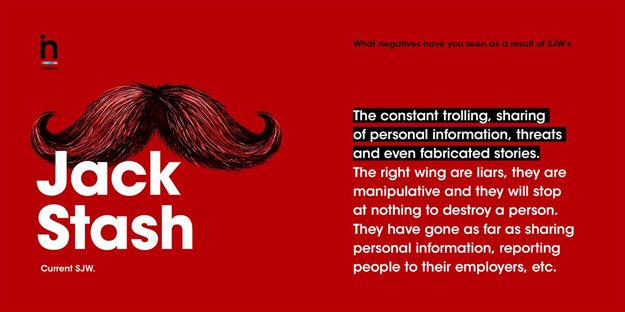
Top stories


ESG & Sustainability#BudgetSpeech2026: SRD grant unchanged, other Sassa social grants see hike
10 hours



More news












ESG & Sustainability
South Africa’s carbon tax should stay: climate scientists explain why










If in_’s inbox and post comments are anything to go by, allowing an opinion on the subject from those who dislike the subject is tantamount to open the platform up for criticism. It’s a given … but how far should in_ go?
How much abuse should the platform take given its reason for being is to show/share all opinions regardless of what they are or who is making them, even if we personally find them distasteful? It’s an important concern because, if we pretend they don’t exist (and don’t publish them), we might eventually forget that they exist, and therein lies the danger.
So, I always knew unpacking social justice warriors would be fraught, that in_ would land up offending on both the left and right wings of politics. That we have a left and right is one of the great challenges of modern-day polarised politics and social dynamics.
So, this is how the social justice warriors unpack went down …
The term ‘social justice warriors’ is considered a pejorative by the Oxford English Dictionary. Invented in 1834, it had been a neutral term until 2008 when the phase ascribed antagonistic and disrespectful behaviour. Not that that was how many within the movement saw/see themselves.
SJW July Eccles was the first podcast of the exploration and expressed thoughtful and considered opinions on the term, as well as the work that SJWs do. July also rejects the pejorative status assigned by the Oxford English Dictionary.
“I personally embrace the term SJW, to me being a Social Justice Warrior is a compliment. Whenever we get smeared or tarred or people try and say ‘you're a this, a that, a snowflake’ etc I simply reject that and I say ‘I am a Social Justice Warrior because I car’” and you've tried to smear me with that term. I reject that entirely and I don't take it as a pejorative.”
It's easy to see July’s point. From the perspective of SJWs, they are in a tenuous position which has been under attack for generations. Those that SJWs tend to fight for or alongside are sections of the population that have been silenced for so long. They no longer casually accept perceived bigotry and have decided that, regardless of how the world reacts to them, they are going to stand up and be counted alongside their formerly silenced compatriots.
When I spoke to a former SJW, although she deeply appreciated the work she was involved in, she admitted she had “... found it personally taxing - emotionally, mentally and physically- to fight a battle that seemed wasn't going anywhere.”

An active SJW, Jack Stash, works under a pseudonym to protect himself, something that is important to know, since many SJWs point to threats to their lives and to ‘doxing’ – that is, to search for and publish private or identifying information about (a particular individual) on the Internet, typically with malicious intent.
Also interesting were the views of two people who have been ‘cancelled’ by many people dedicated to social justice. The first is Jerm, a cartoonist, and the second, Mike Cernovich. Both Jerm and Mike Cernovich dislike SJWs. Mike, in particular, speaks to conflicts within the SJW movement. In fact, he highlights that SJW’s tend to attack their own, whereas those on the right tend to rally around anyone on their ‘side’.
SJWs have proved to be a powerful voice in the broader world of social justice, and it’s in large part thanks to their work on online platforms that has provided the impetus for change. Every individual movement has a beginning and an end, but the need for SJWs will never diminish. The question we need to ask is how will social justice campaigning evolve?
